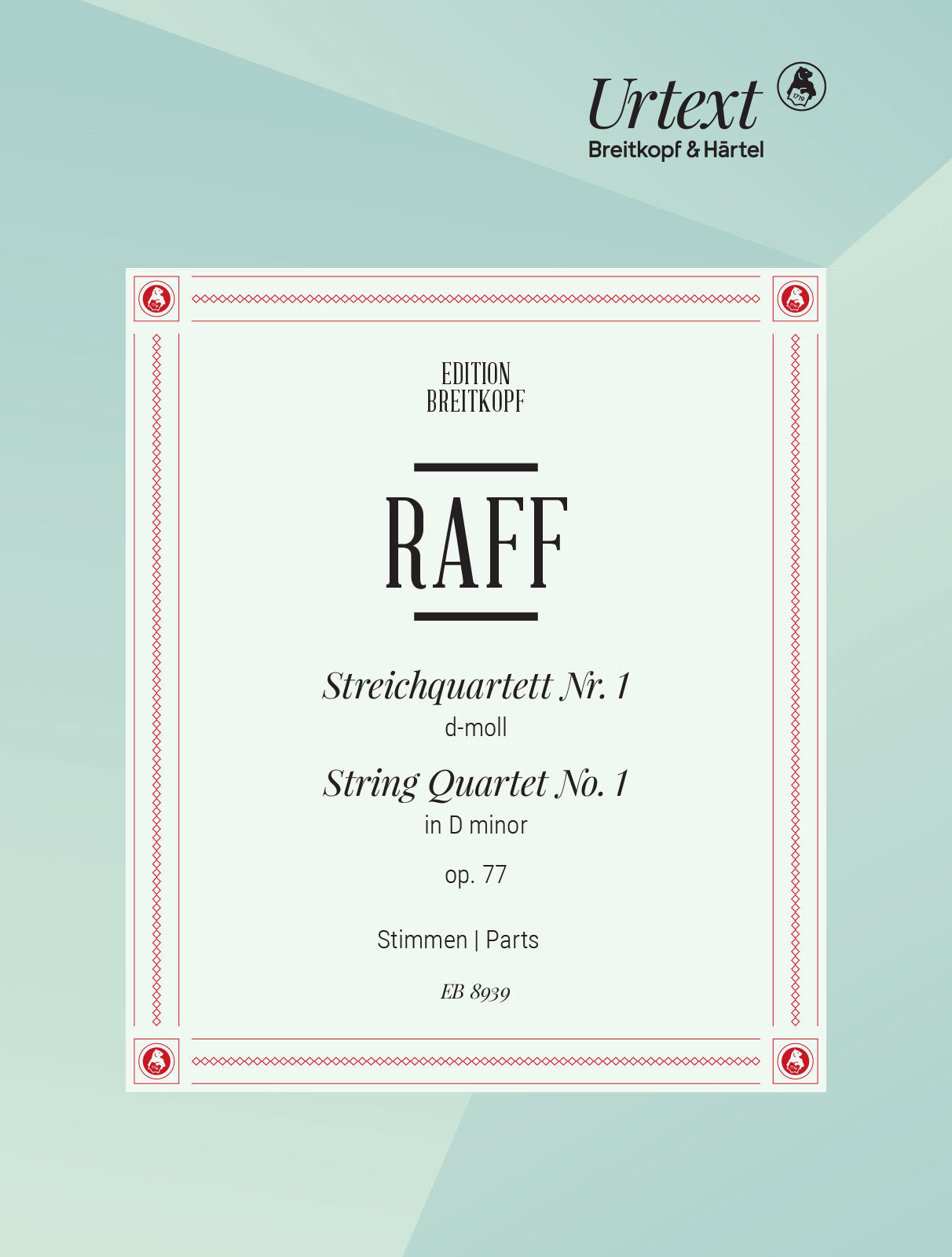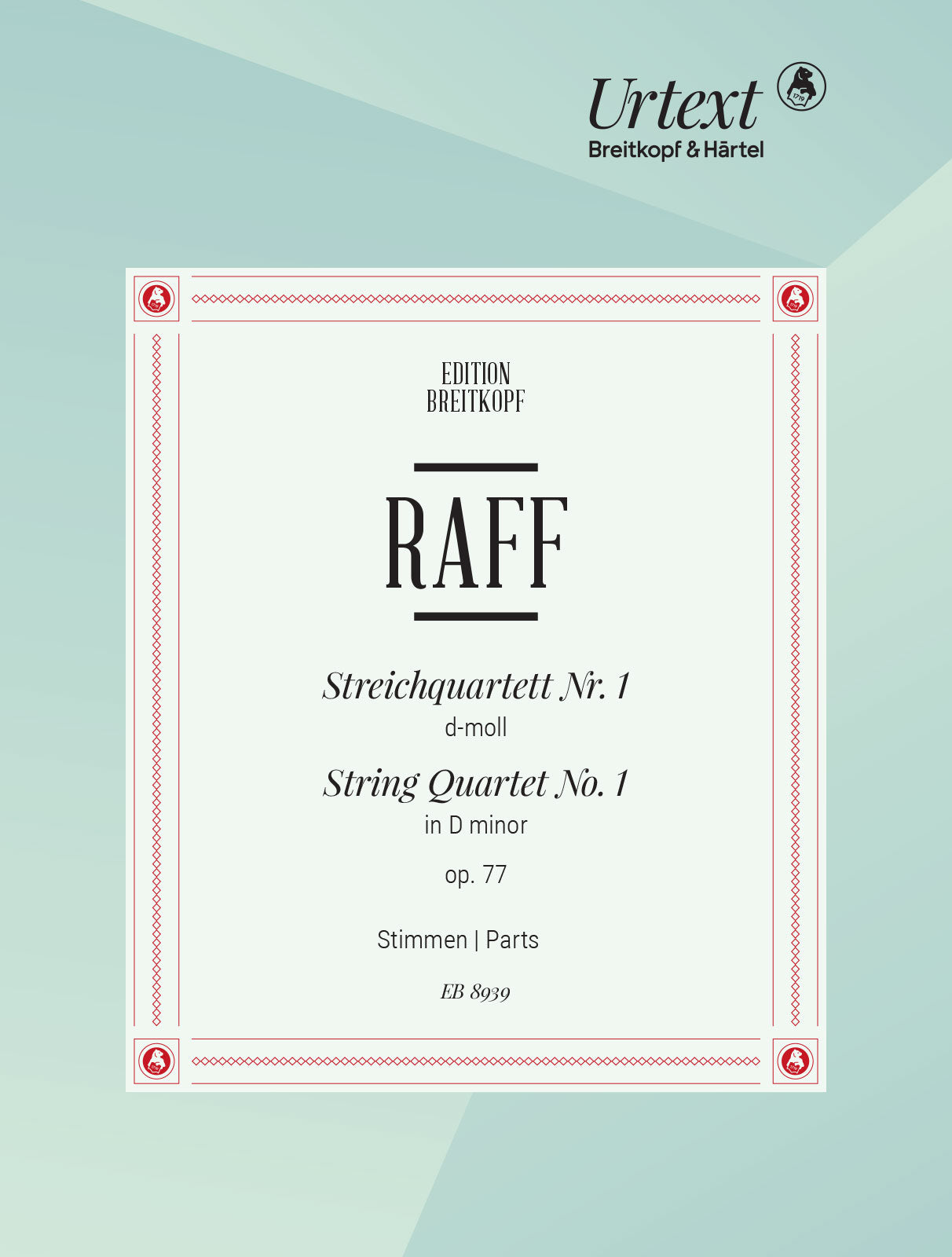Raff: String Quartet No. 1 in D Minor, Op. 77
In stock and typically ships within 1 business day.
- Composer: Joachim Raff (1822-1882)
- Instrumentation: String Quartet (Violin I, Violin II, Viola, Cello)
- Work: String Quartet No. 1 in D Minor, Op. 77
- ISMN:
- Size: 9.1 x 12.0 inches
- Pages: 88
- Urtext / Critical Edition
Description
With his first String Quartet in D Minor, Op. 77, composed in 1855, the native Swiss composer Joachim Raff bid a brilliant farewell to Weimar. He had been there as Franz Liszt's assistant since 1850 and had made a name for himself in the city's art scene – now he embarked on new paths. He composed his second Quartet in A Major, Op. 90, already in 1857 in Wiesbaden, the spa town that was to become his home for 21 years. The two quartets are unequivocal works: orchestrally-conceived, full of energetic vigor, and at times uncompromisingly modern. They confidently continue the Beethoven tradition and attest at the same time to Raff's intensive confrontation with Richard Wagner's music during the Weimar years. in his chamber music, the composer wanted to achieve progress"in an inherently historical way" and"to ground the individual substance in existing forms," as he told the Viennese violinist Josef Hellmesberger, who launched opus 77. The quartets, first published in 1860/62, found illustrious interpreters, among them, the Müller brothers' renowned ensemble, to which opus 90 was also dedicated, and Joseph Joachim. in collaboration with the Joachim-Raff-Archiv Lachen (CH)
Publishers use a lot of words to describe what they sell, and we know it can be confusing. We've tried to be as clear as possible to make sure you get exactly what you are looking for. Below are descriptions of the terms that we use to describe the various formats that music often comes in.
Choral Score
A score for vocalists that only contains the vocal lines. The instrumental parts are not there for reference. Generally, cheaper than a vocal score and requires multiple copies for purchase.
Facsimile
Reproductions of the original hand-written scores from the composer.
Full Score
For ensemble music, this indicates that the edition contains all parts on a single system (there are not separate parts for each player). In larger ensembles, this is for the conductor.
Hardcover
Hardbound. Generally either linen-covered or half-leather.
Orchestral Parts
Similar to a wind set, this is a collection of parts. In the case of strings, the numbers listed are the number of copies included, though generally these are available individually (often with minimum quantities required).
Paperback
When publishers offer multiple bindings (e.g. hardcover) or study scores, this is the "standard" version. If you're planning to play the music, this is probably what you want.
Performance / Playing Score
A score of the music containing all parts on one system, intended for players to share. There are not separate parts for each player.
Set of Parts
For ensemble music, this indicates that there are separate individual parts for each player.
Solo Part with Piano Reduction
For solo pieces with orchestra, this is a version that contains a piano reduction of the orchestra parts. For piano pieces, two copies are typically needed for performance.
Study Score
A small (think choral size) copy of the complete score meant for studying, and not playing. They make great add-ons when learning concertos and small chamber works.
Vocal Score
A score prepared for vocalists that includes the piano/organ part or a reduction of the instrumental parts.
Wind Set
For orchestral music, this is a collection of wind and percussion parts. The specific quantities of each instrument are notated.
With Audio
In addition to the printed music, the edition contains recordings of the pieces. This may be an included CD, or access to files on the internet.
With / Without Fingering (Markings)
Some publishers prepare two copies - a pure Urtext edition that includes no fingering (or bowing) suggestions and a lightly edited version that includes a minimal number of editorial markings.




